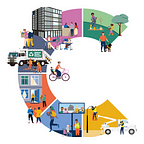How can local government unleash collective imagination to tackle complex challenges?
This post, written by Camden’s Director of Strategy and Design and IIPP Policy Fellow Nick Kimber, is the first in a series which will explore missions-oriented change at Camden and beyond: what the approach is, why Local Authorities and other place-based institutions might take it, and how to deliver it in practice. The series will outline the ongoing work developed in partnership with UCL Institute forInnovation and Public Purpose (IIPP). We’ll publish the next instalments on Change by Design over the coming months. A version of this post is also posted on the IIPP blog.
Our times are characterised by multiple and overlapping crises. The COVID 19 pandemic and the enduring cost of living crisis have further compounded long-underlying problems — such as structural inequality, mitigating the damage from the climate emergency, and the need to transition to a digital economy. This asks fundamental questions about how we are governed and the role of the state: how to coordinate urgent responses with prevention and early help? How to better serve those failed over the decades or generations? And how can government and public work together to shift resources and priorities towards fresh demands that arise as a ruler of crisis?
Central governments have struggled to respond, lacking both the legitimacy and the agility to make sense of both endemic challenges and more immediate crises.
Local communities, on the other hand, have waded in and stepped up. The pandemic saw ordinary people organise mutual aid responses to Covid 19, blending radical kindness with a bias to swift action. Social action sprung into play to support the most vulnerable over the course of this winter, from warm spaces to baby banks. Some of these were entirely grassroots efforts. Sometimes, they were backed by local government or third sector organisations, which can be used to acting in more agile ways than Westminster and Whitehall.
Despite this action taken by councils and others, in the UK this period has nonetheless exposed a lack of investment in place-based institutions. It has also highlighted the imbalanced relationship between central and local government. The speed of the crisis has reinforced a tendency towards centralisation, sometimes reversing hard won gains made over the last decade of English devolution policy. The ‘antique machinery’ of Whitehall was forged in response to 20th century challenges, and to this day economics remains its dominant discipline. This feels increasingly anachronistic in an environment in which citizen participation, design, imagination, and community power have been seen to be better able to respond to the complexity of our age.
So, new local capacity and capabilities are needed. But what types, how can we create them, and how do they play out across an overall system of government?
In Camden, we think part of the answer lies in adopting an approach to change oriented around “missions”, defined by UCL’s Institute for Innovation and Public Purpose (IIPP) as “concrete targets within a challenge that act as frames and stimuli for innovation”.
Camden worked with the IIPP on its Renewal Commission, setting four renewal missions with its communities as a way of charting a course to economic and social renewal in the aftermath of the pandemic. It went further, adopting those missions into its core strategy framework We Make Camden, published in March 2022.
Mission-oriented approaches provide an opportunity to focus the intent and attention of local authorities, brigading scarce innovation capacity, mobilising a different range of actors, and raising ambition. For example, this way of thinking can bring:
- A language to talk about long-term direction, thinking beyond current political and funding cycles and giving consistency of purpose over time.
- A framing that drives collaboration across the functional silos of an organisation towards wider systems of partnership.
- A way to embrace complexity — we have set goals that we don’t know how to achieve, so they require innovation and experimental capacity and a process of ongoing planning and re-planning. Counter intuitively, it is a more planful approach than anything that sets out a detailed roadmap at the beginning.
- A way of emphasising the need to work in deep partnership with communities and develop a more mutualistic relationship with the private sector.
- A deep participatory potential. Camden’s Leader, Georgia Gould, talks about missions as a process of collective and social imagination, an opportunity to dream together, and that through imagining a new, more optimistic future we will be able to achieve more than we ever would if we looked at similar challenges in a narrower way.
Camden has long been a purpose-led organisation. The progression we are starting to make is to build on and retain that sense of purpose and move towards a more systemic approach. It is easy to say you want to work with partners, develop new ways of working, and build a new type of relationships with your community. But how do you actually do it?
Through the IIPP’s Policy Studio, and its Fellowship programme, Camden and IIPP colleagues will be exploring these questions and what the research and practice agenda might be which would help to answer them. A first workshop this month will help to scope this work, reflecting on Camden’s journey, and exploring its relevance for others.
A missions approach forces you to confront this question head on. In the next post, we’ll explore some of what we’ve learned so far about the organisational and local capacity and capabilities needed to deliver on this agenda.
